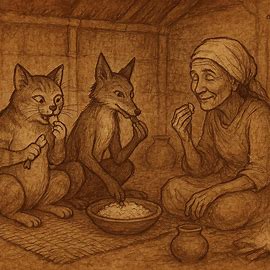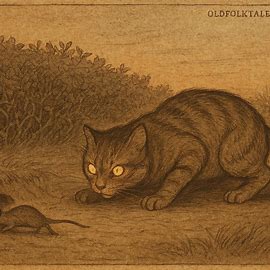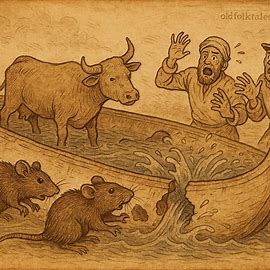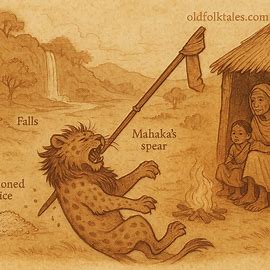On a quiet evening in the highlands of Madagascar, two tricksters named Kotofetsy and Mahaka wandered across the countryside in search of mischief. Their eyes roamed restlessly over the land, scanning for an opportunity to satisfy both their hunger and their cunning. As dusk crept across the fields, the fading sunlight revealed a humble home tucked near the foot of a hill. The dwelling belonged to an old shepherdess who kept a flock of fat-tailed sheep in a small pen nearby.
The flock, plump and well-kept, stirred an instant temptation in the hearts of the tricksters. Rather than face the difficulty of stealing the sheep outright, Kotofetsy and Mahaka devised a crueler plan. Moving swiftly under the cover of darkness, they crept into the sheep pen. One by one, they cut off the tails of every sheep in the flock, careful not to be caught. The severed tails were quickly bundled together. With their prize in hand, they approached the old woman’s house and knocked politely on her door.
The old shepherdess welcomed them without suspicion. Her eyes softened at the sight of the travelers, and with the generosity characteristic of her people, she spread a woven mat on the floor for them to rest. “Well then, my children,” she said kindly, “night is falling fast. What food have you brought with you? Hand it over, and I will cook it for our supper.”
Kotofetsy and Mahaka exchanged sly glances before offering her the bundle of sheep tails. The old woman, unaware that the tails belonged to her own flock, accepted them without hesitation. She set about cooking, boiling the tails in a pot and pairing them with freshly cooked rice. The savory smell filled the room, warming the hearts of the two rogues who knew their plan had succeeded.
When the food was ready, the three sat down to eat. The tricksters, determined to deepen the woman’s deception, leaned toward her and said, “Grandmother, as you eat, repeat these words to yourself: Paopao! ô Besavily, one can safely eat what belongs to oneself.”
READ THIS: Kotofetsy and Mahaka’s Death: A Merina Folktale That Teaches Lessons on Betrayal and Patience
Obediently, the old woman repeated the phrase under her breath with each mouthful. The rhythm of the chant seemed strange, but her hunger was great, and she thought little of it. Bite after bite, she ate her meal, silently affirming words whose meaning had yet to dawn on her. Kotofetsy and Mahaka smirked knowingly as they shared in the feast, enjoying not only the food but also the success of their ruse.
The following morning, before the sun rose high, the two tricksters gathered their belongings and set off once more on the road. They left behind nothing but a trail of dust and the memory of their false courtesy.
Later that day, the shepherdess walked to the pen to lead her flock out to pasture. What she saw stopped her in her tracks. Her beloved sheep, usually so splendid with their heavy tails, now stood mutilated. Each animal’s tail had been cut clean off, leaving behind nothing but raw stumps. A cry of anguish escaped her lips as the truth struck her.
The phrase she had been taught to repeat during supper now revealed its meaning: “One can safely eat what belongs to oneself.” Those words, mocked by the tricksters, pointed to the cruel reality that she had been feasting on her own sheep’s tails. Her trust and kindness had been twisted into tools of her own undoing.
Her heart ached with sorrow, and though anger welled within her, she knew it was too late. Kotofetsy and Mahaka were already far away, beyond the reach of her cries. She wept bitterly, her grief echoing through the hills, mourning not only her loss but also the betrayal of her goodwill.
Moral Lesson
This Merina folktale warns of the dangers of blind trust and misplaced kindness. While generosity is a virtue, it must be accompanied by discernment. The old shepherdess opened her heart and home to strangers, treating them as children, but her unquestioning trust left her vulnerable to deception.
The tale reminds us that wisdom lies in balancing compassion with caution. Not all who appear in need are deserving of our trust, and kindness without vigilance may invite harm. In the world of Kotofetsy and Mahaka, cleverness often triumphs over innocence, but the lasting lesson is clear: to guard one’s trust carefully while practicing generosity wisely.
Knowledge Check
1. Who were Kotofetsy and Mahaka in the folktale?
They were two notorious tricksters from Merina folklore known for deceiving others through cunning schemes.
2. What did the tricksters take from the old woman’s flock?
They cut off the tails of all her sheep and later cooked them for supper.
3. Why did the old shepherdess not realize the deception immediately?
She trusted the strangers, assumed the tails were ordinary meat, and repeated their phrase without questioning.
4. What was the meaning of the chant “Paopao! ô Besavily, one can safely eat what belongs to oneself”?
It revealed that she was unknowingly eating the tails of her own sheep.
5. What key lesson does this Merina folktale teach?
It teaches the importance of guarding against gullibility and balancing kindness with discernment.
6. Where does this folktale originate?
It originates from the Merina people of Madagascar.
Source: Merina folktale, Madagascar.






